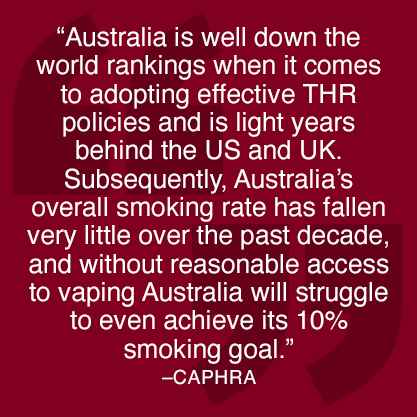Australia is lagging well behind many other countries in the Asia Pacific region when it comes to successfully tackling smoking through vaping, says the Coalition of Asia Pacific Tobacco Harm Reduction Advocates (CAPHRA).
CAPHRA’s observation comes as Australia’s Department of Health seeks feedback on its Draft National Smoking Strategy 2022 – 2030, with public submissions closing on 24 March 2022.

“We encourage vapers and supporters of a progressive Tobacco Harm Reduction (THR) approach to have their say. Australians desperate to quit smoking and those keen to stay off deadly cigarettes need all the help they can get,” says Nancy Loucas, Executive Coordinator of CAPHRA.
On 1 October 2021, Australia’s Therapeutic Goods Administration (TGA) expanded its prescription-only model with customs clamping down at the border on the likes of personal imports of nicotine vaping liquids from overseas websites. Dubbed ‘Black Friday’ by CAPHRA, the day marked cigarettes becoming much easier to obtain in Australia than safer nicotine products.
Ms Loucas says not only is the successful role safer nicotine products can play completely absent in Australia’s draft strategy, it lacks ambition. The strategy proposes achieving a 10% or less overall smoking rate by 2025, while New Zealand is driving a 5% smokefree goal and looks on target to achieve it.
“Instead of banning vaping, New Zealand has regulated it, making it tough for minors to access but available to all adults keen to keep off the cancer sticks. New Zealand is seeing its overall smoking rate tumble, yet the Australian Government fails to accept that the most effective smoking cessation tool available is staring it in the face,” she says.
Australia’s failed ‘quit or die’ approach towards tobacco continues to see over 20,000 smokers die prematurely from smoking-related illnesses, with 2.3 million still smoking. CAPHRA says the Philippines is set to regulate safer nicotine products, with even Malaysia and Thailand now looking to lift their unsuccessful vaping bans.

“Australia is well down the world rankings when it comes to adopting effective THR policies and is light years behind the US and UK. Subsequently, Australia’s overall smoking rate has fallen very little over the past decade, and without reasonable access to vaping Australia will struggle to even achieve its 10% smoking goal,” says Nancy Loucas.
CAPHRA believes as part of its new strategy, Australia’s Department of Health should closely investigate the 67 countries which have adopted regulatory frameworks on safer nicotine products, registering a dramatic decline in smoking prevalence since.
To make a submission on Australia’s Draft National Smoking Strategy before 24 March, visit: https://consultations.health.gov.au/atodb/national-tobacco-strategy-2022-2030/
Broadcast live at 7.00pm Hong Kong Time on 13 March, The Advocates Voice (TAV) will discuss ‘Australia – Is there hope that the current ‘quit or die’ approach to vaping is on the way out?’ To hear the views of key Asia Pacific THR advocates visit: https://youtu.be/HnuApgneKPI

A global collaboration of THR consumer groups, sCOPe, has launched a comprehensive library of online panel discussions and presentations. In November 2021, sCOPe broadcast around the clock during COP9 – the 9th Conference of Parties for the World Health Organization’s Framework Convention on Tobacco Control (FCTC). To access sCOPe’s online library visit, https://bit.ly/319zzkx
Boasting over 14,000 testimonials, CAPHRA is calling on those who’ve quit cigarettes through smoke-free nicotine alternatives to tell their story on www.righttovape.org
For a free digital media repository on tobacco harm reduction in Asia Pacific – including media releases, images and graphics – please visit https://apthrmedia.org
About CAPHRA
The Coalition of Asia Pacific Tobacco Harm Advocates (CAPHRA) is a regional alliance of consumer tobacco harm reduction advocacy organizations. Its mission is to educate, advocate and represent the right of adult alternative nicotine consumers to access and use of products that reduce harm from tobacco use.



















